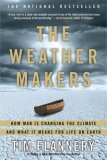Summary | Excerpt | Reviews | Beyond the Book | Readalikes | Genres & Themes | Author Bio
How Man Is Changing the Climate and What It Means for Life on Earth
by Tim Flannery

Critics' Opinion:
Readers' Opinion:
First Published:
Mar 2006, 352 pages
Paperback:
Jan 2001, 400 pages
 Book Reviewed by:
Book Reviewed by:
BookBrowse Review Team
Buy This Book
Earth’s thermostat is a complex and delicate mechanism, at the heart of which lies carbon dioxide, a colorless and odorless gas. CO2 plays a critical role in maintaining the balance necessary to all life. It is also a waste product of the fossil fuels that almost every person on the planet uses for heat, transport, and other energy requirements. On dead planets such as Venus and Mars, CO2 makes up most of the atmosphere, and it would do so here if living things and Earth’s processes did not keep it within bounds. Our planet’s rocks and waters are packed with carbon itching to get airborne and oxidized. As it is, CO2 makes up around 3 parts per 10,000 in Earth’s atmosphere. It’s a modest amount, yet it has a disproportionate influence on the planet’s temperature. Because we create CO2 every time we drive a car, cook a meal, or turn on a light, and because the gas lasts around a century in the atmosphere, the proportion of CO2 in the air we breathe is rapidly increasing.
The institutions at the forefront of climate change research are situated half a world away from my home in Adelaide, so for a time I flew frequently across the globe. One night when en route from Singapore to London, as we crossed the great Eurasian landmass, I looked out of the cabin window at a city illuminated below. Its network of lights stretched from horizon to horizon, and the lights burned so bright—with so much energy—as to alarm me. From a height of 33,000 feet the atmosphere seemed so thin and fragile—the breathable part of it lay 16,500 feet below our aircraft. I asked the airline steward where we were. She gave me the name of a city I didn’t know. With a jolt I realized that the world is full of such cities, whose fossil-fuel-driven lights cause our planet to blaze into the night sky.
By late 2004, my interest had turned to anxiety. The world’s leading science journals were full of reports that glaciers were melting ten times faster than previously thought, that atmospheric greenhouse gases had reached levels not seen for millions of years, and that species were vanishing as a result of climate change. There were also reports of extreme weather events, long-term droughts, and rising sea levels.
For months I tried to fault the new research findings and discussed them at length with friends and colleagues. Only a few people seemed aware of the great changes under way in our atmosphere. And some people I loved and respected continued doing things—such as buying large cars and air conditioners—that I now suspected to be very bad indeed.
By the end of the year, however, glimmers of hope were beginning to emerge, with almost every head of government in the developed world alive to the issue. But we cannot wait for the issue to be solved for us. The most important thing to realize is that we can all make a difference and help combat climate change at almost no cost to our lifestyle. And in this, climate change is very different from other environmental issues, such as biodiversity loss and the ozone hole.
The best evidence indicates that we need to reduce our CO2 emissions by 70 percent by 2050. If you own a four-wheel-drive and replace it with a hybrid fuel car, you can achieve a cut of that magnitude in a day rather than half a century. If your electricity provider offers a green option, for the cost of a daily cup of coffee you will be able to make equally major cuts in your household emissions. And if you vote for a politician who has a deep commitment to reducing CO2 emissions, you might change the world. If you alone can achieve so much, so too can every individual and, in time, industry and government on Earth.
The transition to a carbon-free economy is eminently achievable because we have all the technology we need to do so. It is only a lack of understanding and the pessimism and confusion generated by special interest groups that is stopping us from going forward.
Copyright © 2005 by Tim Flannery. Reprinted with permission from Grove Atlantic, Inc. All rights reserved.





The Flower Sisters
by Michelle Collins Anderson
From the new Fannie Flagg of the Ozarks, a richly-woven story of family, forgiveness, and reinvention.

The House on Biscayne Bay
by Chanel Cleeton
As death stalks a gothic mansion in Miami, the lives of two women intertwine as the past and present collide.

The Funeral Cryer by Wenyan Lu
Debut novelist Wenyan Lu brings us this witty yet profound story about one woman's midlife reawakening in contemporary rural China.
Your guide toexceptional books
BookBrowse seeks out and recommends the best in contemporary fiction and nonfiction—books that not only engage and entertain but also deepen our understanding of ourselves and the world around us.